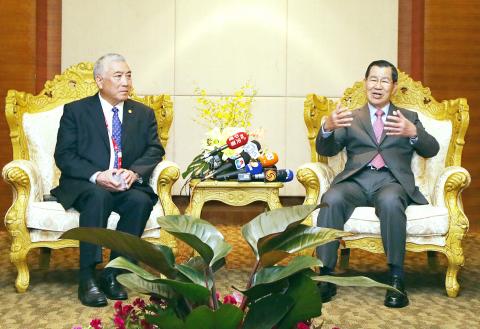Former vice president Vincent Siew (蕭萬長) yesterday said that he would express Taiwan’s interest in taking part in the emerging Asia Infrastructure Investment Bank (AIIB), the China-led regional financial institution, when he meets with Chinese President Xi Jinping (習近平) today, according to a report.
Siew, head of Taiwan’s delegation to this year’s Boao Forum for Asia in China’s Hainan Province, told reporters he is to meet Xi at 9:20am today, the Central News Agency (CNA) reported.
Siew was quoted by the CNA as saying that Taiwan should be part of the AIIB and that he would “make a case for it whenever I have the chance to speak to China’s leaders.”

Photo: CNA
President Ma Ying-jeou (馬英九) told Siew to declare Taiwan’s interest in the AIIB during a meeting on Tuesday, according to an interview with Ma by the Want Want China Times Group (旺旺中時集團) on Thursday.
Ma listed three reasons Taiwan should join the AIIB, but said that some issues might need to be discussed first, including in what capacity Taiwan would be admitted to the body, which requires statehood as a condition of membership.
Among the reasons Ma listed were that Taiwan could serve as a peacemaker and humanitarian aid provider in the international community, that taking part in the AIIB would be helpful to Taiwan’s bids to be part of the Trans-Pacific Partnership and the Regional Comprehensive Economic Partnership, and that working with China in its initiatives, supported by many other countries, would benefit cross-strait relations.
China has put making plans for the implementation of its “One Belt, One Road” policy, which it envisions, together with the AIIB, connecting China with countries in Central Asia, Southeast Asia, Africa and Europe through construction of infrastructure projects, on top of the agenda of the four-day forum, which opened on Thursday.
With South Korea and Turkey announcing their bids to join the AIIB yesterday, the number of prospective members reached 37 before the Tuesday deadline set by China for countries to seek founding memberships.
China’s Association for Relations Across the Taiwan Straits Deputy Chairman Zheng Lizhong (鄭立中) told a cross-strait meeting in Taipei last month that the “One Belt, One Road” policy would open up a good channel for Taiwan’s investment, but the government said last week that Taiwan has not been invited to join the AIIB.
When Premier Mao Chi-kuo (毛治國) was asked by lawmakers about the government’s willingness to apply to join the AIIB on Friday last week, he said the government would carry out an assessment when it was invited to do so.
Minister of Foreign Affairs David Lin (林永樂) yesterday said that Taiwan would seek to join the AIIB on the condition that it receives dignified treatment.
“We are expressing our interests, but we will not accept any degrading arrangements in terms of the way we would be allowed to participate, in what capacity, in how Taiwan is treated and our designation. We’ll deal with these issues through negotiation,” Lin said.

A magnitude 7.0 earthquake struck off Yilan at 11:05pm yesterday, the Central Weather Administration (CWA) said. The epicenter was located at sea, about 32.3km east of Yilan County Hall, at a depth of 72.8km, CWA data showed There were no immediate reports of damage. The intensity of the quake, which gauges the actual effect of a seismic event, measured 4 in Yilan County area on Taiwan’s seven-tier intensity scale, the data showed. It measured 4 in other parts of eastern, northern and central Taiwan as well as Tainan, and 3 in Kaohsiung and Pingtung County, and 2 in Lienchiang and Penghu counties and 1

FOREIGN INTERFERENCE: Beijing would likely intensify public opinion warfare in next year’s local elections to prevent Lai from getting re-elected, the ‘Yomiuri Shimbun’ said Internal documents from a Chinese artificial intelligence (AI) company indicated that China has been using the technology to intervene in foreign elections, including propaganda targeting Taiwan’s local elections next year and presidential elections in 2028, a Japanese newspaper reported yesterday. The Institute of National Security of Vanderbilt University obtained nearly 400 pages of documents from GoLaxy, a company with ties to the Chinese government, and found evidence that it had apparently deployed sophisticated, AI-driven propaganda campaigns in Hong Kong and Taiwan to shape public opinion, the Yomiuri Shimbun reported. GoLaxy provides insights, situation analysis and public opinion-shaping technology by conducting network surveillance

‘POLITICAL GAME’: DPP lawmakers said the motion would not meet the legislative threshold needed, and accused the KMT and the TPP of trivializing the Constitution The Legislative Yuan yesterday approved a motion to initiate impeachment proceedings against President William Lai (賴清德), saying he had undermined Taiwan’s constitutional order and democracy. The motion was approved 61-50 by lawmakers from the main opposition Chinese Nationalist Party (KMT) and the smaller Taiwan People’s Party (TPP), who together hold a legislative majority. Under the motion, a roll call vote for impeachment would be held on May 19 next year, after various hearings are held and Lai is given the chance to defend himself. The move came after Lai on Monday last week did not promulgate an amendment passed by the legislature that

AFTERMATH: The Taipei City Government said it received 39 minor incident reports including gas leaks, water leaks and outages, and a damaged traffic signal A magnitude 7.0 earthquake struck off Taiwan’s northeastern coast late on Saturday, producing only two major aftershocks as of yesterday noon, the Central Weather Administration (CWA) said. The limited aftershocks contrast with last year’s major earthquake in Hualien County, as Saturday’s earthquake occurred at a greater depth in a subduction zone. Saturday’s earthquake struck at 11:05pm, with its hypocenter about 32.3km east of Yilan County Hall, at a depth of 72.8km. Shaking was felt in 17 administrative regions north of Tainan and in eastern Taiwan, reaching intensity level 4 on Taiwan’s seven-tier seismic scale, the CWA said. In Hualien, the